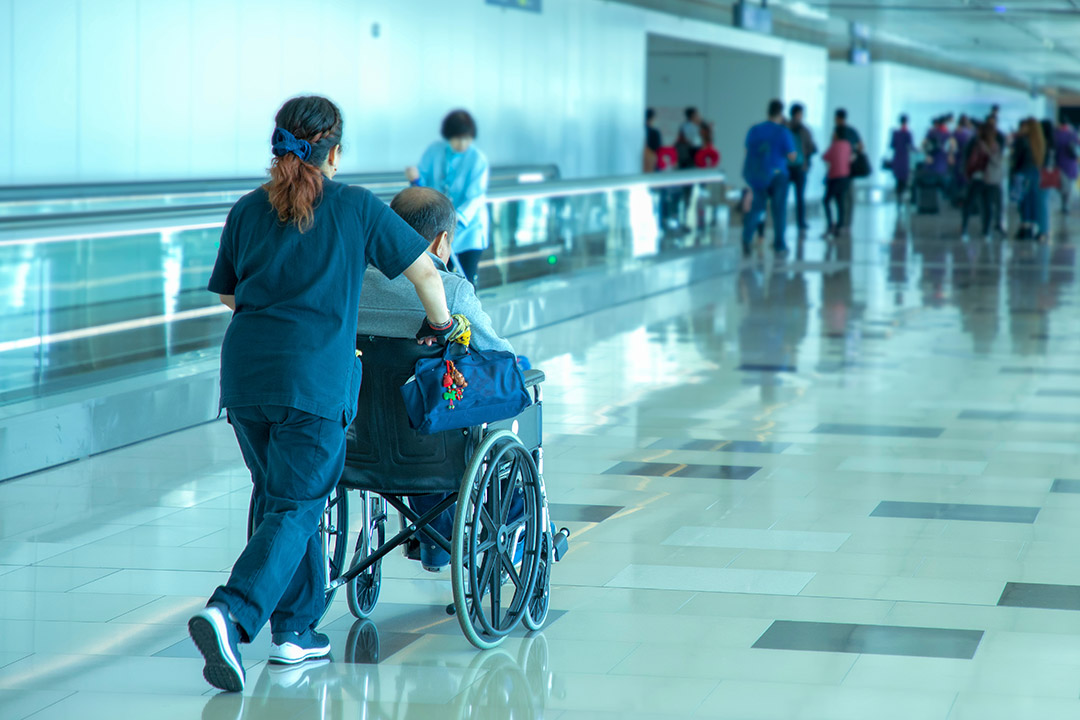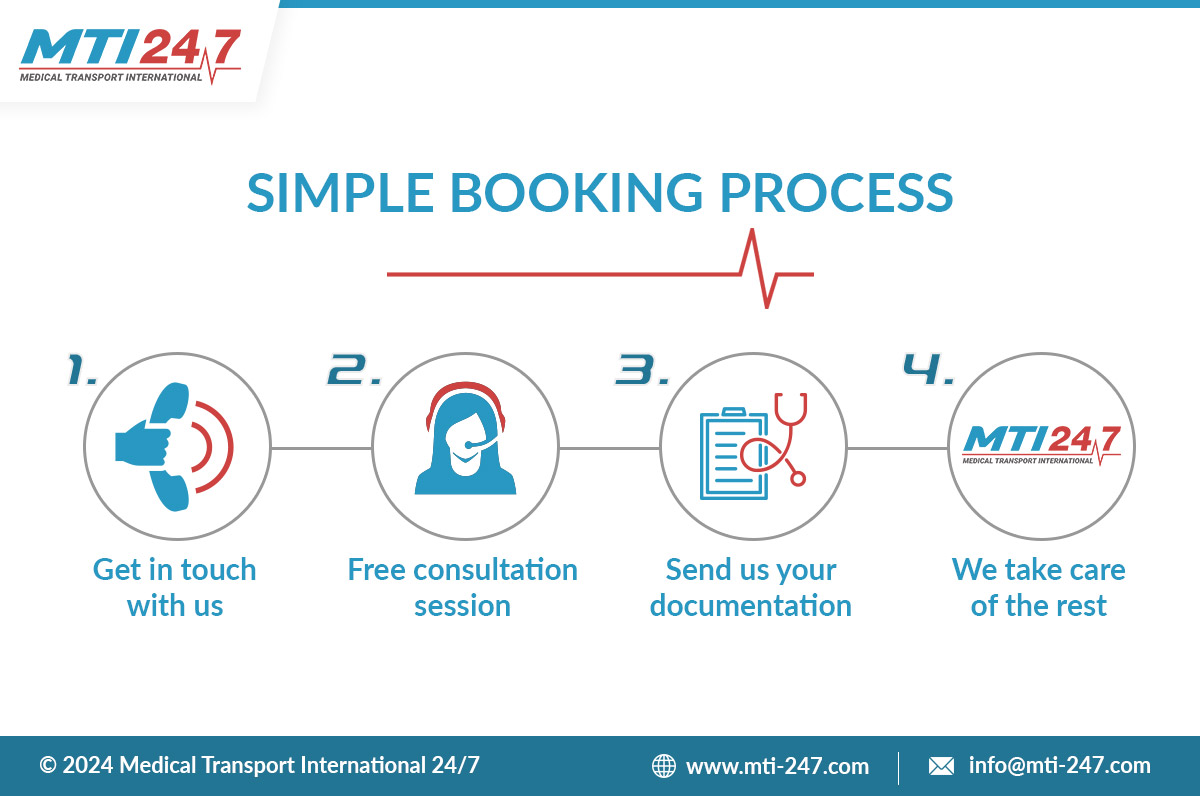Wondering whether it is safe for someone with Alzheimer's to travel by air? This concern weighs heavily on many families; and yes, it absolutely can be done safely. Many families believe air travel becomes impossible after an Alzheimer's diagnosis, but that is simply not true. With proper planning and the right medical support, your loved one can continue experiencing meaningful journeys. At MTI 24/7, we have safely escorted hundreds of Alzheimer's patients across continents, turning what seems impossible into comfortable, dignified travel experiences that preserve both safety and family connections.
Can Alzheimer's patients fly safely?
Alzheimer's patients can travel safely by air with proper planning and professional support, though symptoms like confusion, agitation, and disorientation present unique challenges that commercial airlines cannot adequately handle alone.
Solo travel is never safe for Alzheimer's patients due to risks of getting lost, medical emergencies, and behavioral incidents, while specialized preparation strategies and medical escorts can transform potentially traumatic journeys into manageable experiences.
MTI 24/7's medical escort services provide trained healthcare professionals who accompany patients throughout their entire journey, offering medication management, crisis intervention, and complete peace of mind for families worldwide.
What is Alzheimer's disease?
Alzheimer's is not just "forgetting where you put your keys"; it is a progressive brain disease that gradually steals memories, cognitive abilities, and eventually, independence. While your loved one may seem fine one moment and confused the next, this is not their fault or yours. The disease attacks brain cells, creating protein plaques that disrupt communication between neurons. What starts as mild forgetfulness evolves into difficulty recognizing faces, managing daily tasks, and navigating familiar places. Understanding that Alzheimer's affects each person differently is essential: some retain social skills while losing memory, others struggle with language but remember faces. At MTI 24/7, we have witnessed how this unpredictability makes travel planning complex, but never impossible.
Recognizing Alzheimer's Signs: When your loved one needs extra travel support

Is your loved one displaying behaviors that make you question their ability to travel safely? Understanding where they are in the Alzheimer's progression helps determine what level of support they will need during air travel.
Early stage warning signs:
Misplacing items in unusual locations.
Getting lost in familiar neighborhoods.
Poor judgment with money or decision-making.
Forgetting recent conversations or appointments.
Withdrawal from social activities they once enjoyed.
Difficulty finding the right words during conversations.
Moderate stage challenges:
Wandering or getting lost easily.
Trouble controlling bladder or bowels.
Sleep disturbances and sundown syndrome.
Difficulty recognizing family members or friends.
Confusion about time, dates, or current location.
Increased agitation, especially in unfamiliar environments.
Advanced stage concerns:
Difficulty swallowing or eating.
Increased vulnerability to infections.
Loss of physical coordination and mobility.
Complete dependence on others for daily care.
Severe memory loss and inability to communicate.
At MTI 24/7, we understand that each stage presents unique travel challenges, from mild confusion at security checkpoints to complete disorientation during flights, which is why our healthcare professionals are trained specifically for Alzheimer's care.
Does flying make Alzheimer's symptoms worse?
You are probably wondering if that upcoming flight will trigger confusion, agitation, or memory loss in your loved one. The honest answer? It depends entirely on the individual and how well you prepare for the journey.
When flying can worsen Alzheimer's symptoms:
Medication schedule disruptions due to time changes.
Cabin pressure changes may affect cognitive clarity temporarily.
Dehydration from dry cabin air worsens confusion and irritability.
Loud engine noise and crowded spaces increase anxiety and agitation.
Unfamiliar airport environments cause severe disorientation and panic.
Disrupted sleep patterns from time zone changes trigger sundown syndrome.
Sensory overload from security procedures, boarding chaos, and announcements.
When flying does not significantly impact Alzheimer's:
Direct flights avoiding multiple airport transfers.
Short domestic flights with minimal time zone disruption.
Well-hydrated patients with consistent medication timing.
Calm, prepared travelers with familiar companions present.
Flights during the patient's best time of day (usually morning).
Patients in early-stage Alzheimer's with intact coping mechanisms.
At MTI 24/7, we have observed that preparation makes the difference. Our medical crew know exactly how to minimize these triggers while maximizing comfort, turning potentially distressing flights into manageable experiences for Alzheimer's patients.

Why commercial flying feels impossible with Alzheimer's, and what really happens
Think navigating airport security is stressful for you? Imagine experiencing it while your brain cannot process what is happening or why strangers are asking you to remove your shoes. Commercial air travel presents a minefield of challenges that can transform a simple journey into a traumatic ordeal for Alzheimer's patients.
Airport navigation nightmares:
Inability to understand or follow TSA instructions.
Wandering away from gates during boarding delays.
Confusion over boarding announcements and gate changes.
Getting lost between check-in and security despite clear signage.
Panic attacks when separated from family during security screening.
Bathroom emergencies with inability to find restrooms independently.
In-flight crisis situations:
Medication confusion due to disrupted schedules.
Refusing to stay seated during turbulence or takeoff.
Emergency bathroom needs they cannot communicate.
Sundown syndrome triggered by cabin lighting changes.
Severe agitation from engine noise and confined spaces.
Inappropriate behavior toward flight attendants or passengers.
Fellow passenger complications:
Risk of being removed from flights due to "disruptive" behavior.
Disturbing other travelers with repetitive questions or behaviors.
Flight attendants untrained to handle dementia-related incidents.
Family members overwhelmed trying to manage everything alone.
At MTI 24/7, we have witnessed these scenarios countless times, which is exactly why our medical teams exist to prevent them before they occur.
Can your Alzheimer's patient fly solo?

The short answer that will save you heartache and potential disaster: absolutely not. If you are even asking this question, deep down you already know the risks are too enormous to gamble with your loved one's safety and dignity.
Why solo travel is dangerous for Alzheimer's patients:
Getting lost after deplaning in unfamiliar airports.
Missing medications at critical times without reminders.
Unable to handle flight delays, cancellations, or gate changes.
Forgetting destination, connecting flights, or why they are traveling.
Unable to communicate medical emergencies or basic needs to crew.
Wandering into restricted airport areas or leaving the terminal entirely.
Becoming agitated or combative when confused, leading to restraint or arrest.
What airlines actually do:
No medical oversight during health emergencies.
Zero accountability if your loved one goes missing.
Flight attendants receive minimal dementia training.
Staff cannot administer medications or provide personal care.
Airlines can legally refuse boarding if behavior seems "disruptive".
"Unaccompanied passenger" services do not cover cognitive impairments.
The one exception that proves the rule: Very early-stage patients on familiar, short domestic routes might manage with extensive preparation, but why risk it when the consequences include your loved one stranded, terrified, and alone in a strange city?
Practical tips that make flying with Alzheimer's actually manageable
Flying with your loved one doesn't have to be the nightmare you're imagining. With the right preparation and these proven strategies, you can turn a potentially overwhelming experience into a manageable journey that keeps everyone safe and comfortable.
Pre-flight preparation that prevents disasters:
Book morning flights when cognitive function peaks naturally.
Carry medical documentation explaining the diagnosis for airport staff.
Choose aisle seats near bathrooms but away from high-traffic galley areas.
Request TSA Cares assistance 72 hours before travel for expedited security.
Pack comfort items (favorite blanket, photos) in carry-on for immediate access.
Prepare a detailed itinerary card with flight info, destination, and emergency contacts.
During flight survival tactics:
Keep bathroom visits frequent and assisted; do not wait for requests.
Maintain normal medication schedule regardless of time zone changes.
Pack familiar snacks; airline food confusion can trigger severe agitation.
Bring noise-canceling headphones to reduce overwhelming engine sounds.
Inform flight attendants discreetly about the condition and potential needs.
Use tablet loaded with familiar photos, music, or videos as distraction tools.
Crisis prevention strategies:
Never leave them alone, even for bathroom breaks.
Carry backup medications in case of delays or lost luggage.
Book direct flights to avoid confusion of connections and transfers.
Have contingency plans for medical emergencies or behavioral episodes.
At MTI 24/7, we know these tips help, but they are just the beginning; our professional medical escort services eliminate the guesswork and guarantee safe passage.
How our medical escorts transform impossible journeys into safe passages
What if you could hand over every worry, every "what if," and every sleepless night of planning to someone who has made this exact journey hundreds of times before? That is exactly what MTI 24/7’s medical escort services deliver, turning your most stressful travel scenario into a professionally managed, dignified experience.
We provide trained healthcare professionals who accompany Alzheimer's patients during air travel. Our healthcare escorts are typically registered nurses or paramedics with specific dementia care expertise who take complete responsibility for your loved one's safety, comfort, and medical needs from departure to arrival. We essentially become their temporary caregiver, advocate, and protector throughout the entire journey.
Your dedicated Alzheimer's-trained medical professional:
Prompt response to medical emergencies or behavioral changes.
Calming presence trained to de-escalate confusion and agitation.
Complete documentation of the journey for family peace of mind.
Medication management and administration according to prescribed schedules.
One-on-one attention throughout the entire journey, never leaving your loved one's side.
What we handle so you do not have to:
Boarding assistance and seat arrangements.
24/7 family updates throughout the journey.
Airport navigation from curbside to aircraft door.
All security interactions and TSA communications.
Ground transportation coordination at destination.
Managing delays, cancellations, or unexpected complications.
In-flight monitoring for comfort, hydration, and bathroom needs.
Why airlines trust MTI 24/7:
Established relationships with major airlines worldwide.
Emergency medical equipment and medications onboard.
Pre-approved medical protocols that prevent flight disruptions.
Direct communication with flight crews about passenger needs.
Global reach, personal touch:
Multilingual escorts for overseas destinations.
Available for domestic and international flights.
Hotel overnight stays if required for connections.
Wheelchair-accessible transportation arrangements.
Same medical escort team for round-trip journeys ensuring familiarity.
At MTI 24/7, we do not just transport patients; we restore families' confidence that their loved ones can continue experiencing life's important moments safely.
When does your Alzheimer's patient need an air ambulance instead of a commercial flight?
Sometimes a medical escort is not enough. When your loved one's condition has progressed beyond what commercial aviation can safely accommodate, MTI 24/7's air ambulance services become the only viable option for urgent or long-distance medical transport.
Situations requiring air ambulance:
Psychiatric complications requiring sedation or restraints.
Need for specialized medical equipment during transport.
Urgent medical transfers between specialized care facilities.
Severe behavioral episodes that would disrupt commercial flights.
Medical emergencies requiring continuous monitoring and life support.
Patients who cannot remain seated or follow basic flight safety instructions.
MTI 24/7 air ambulance advantages for Alzheimer's:
Direct hospital-to-hospital transfers avoiding airport chaos.
Family member accommodation when medically appropriate.
Private, controlled environment eliminating external stressors.
Customized medication protocols and emergency interventions.
Flexible scheduling around the patient's optimal cognitive windows.
Medical team including physicians trained in neurological disorders.
Fully equipped mobile ICU with specialized dementia care protocols.
When commercial flight poses risks to your loved one's safety or dignity, MTI 24/7's air ambulance services ensure they receive the highest level of medical care while traveling to their destination safely and comfortably.
Contact us now for a free consultation!

Stop worrying and start planning. MTI 24/7's free consultation reveals exactly how your Alzheimer's patient can travel safely with professional medical escort services. Contact us for personalized solutions.
Reach us by:
Phone: USA: +16468635532 / UK: +442036080959
Email: info@mti-247.com
Our contact form
:quality(75))
:quality(75))